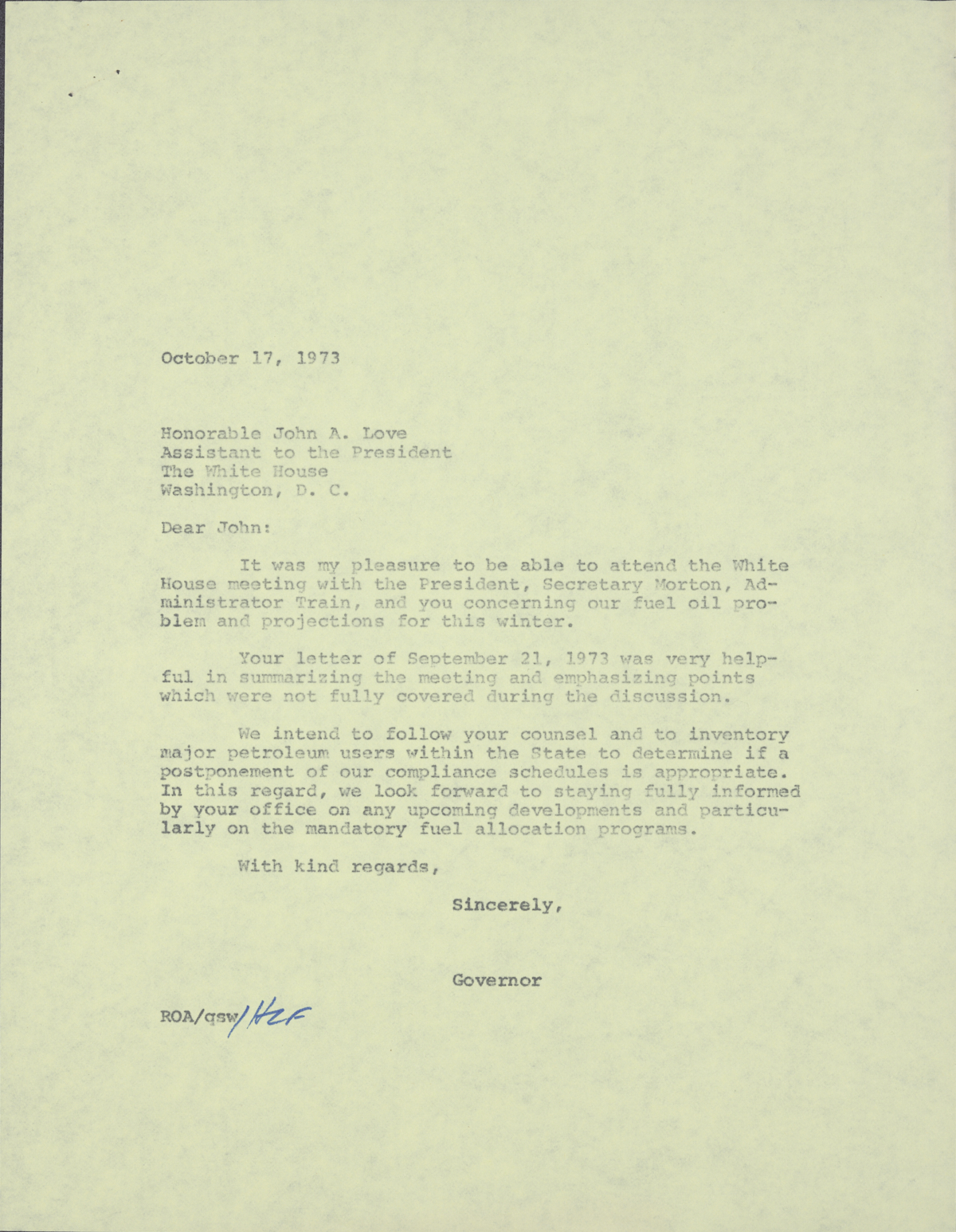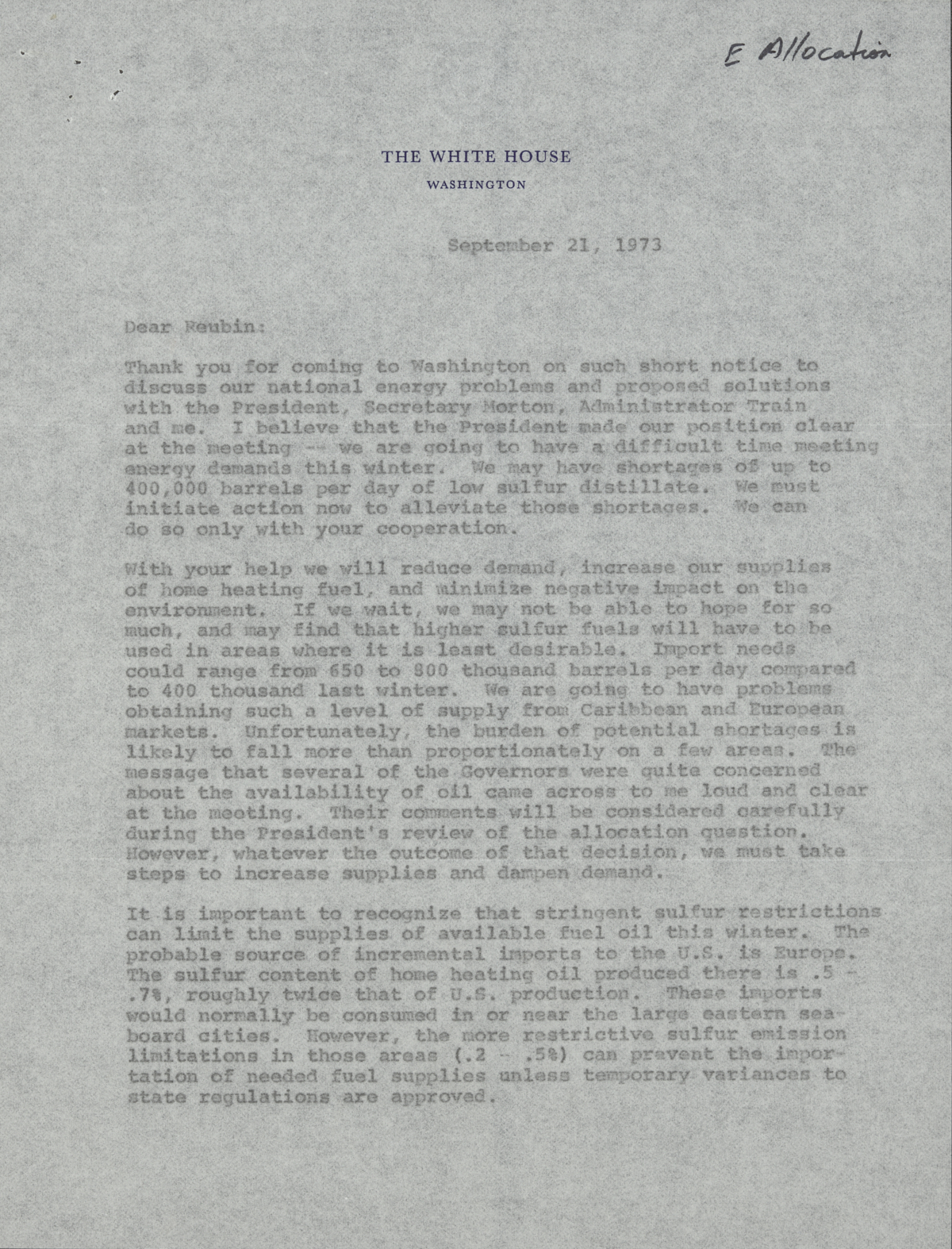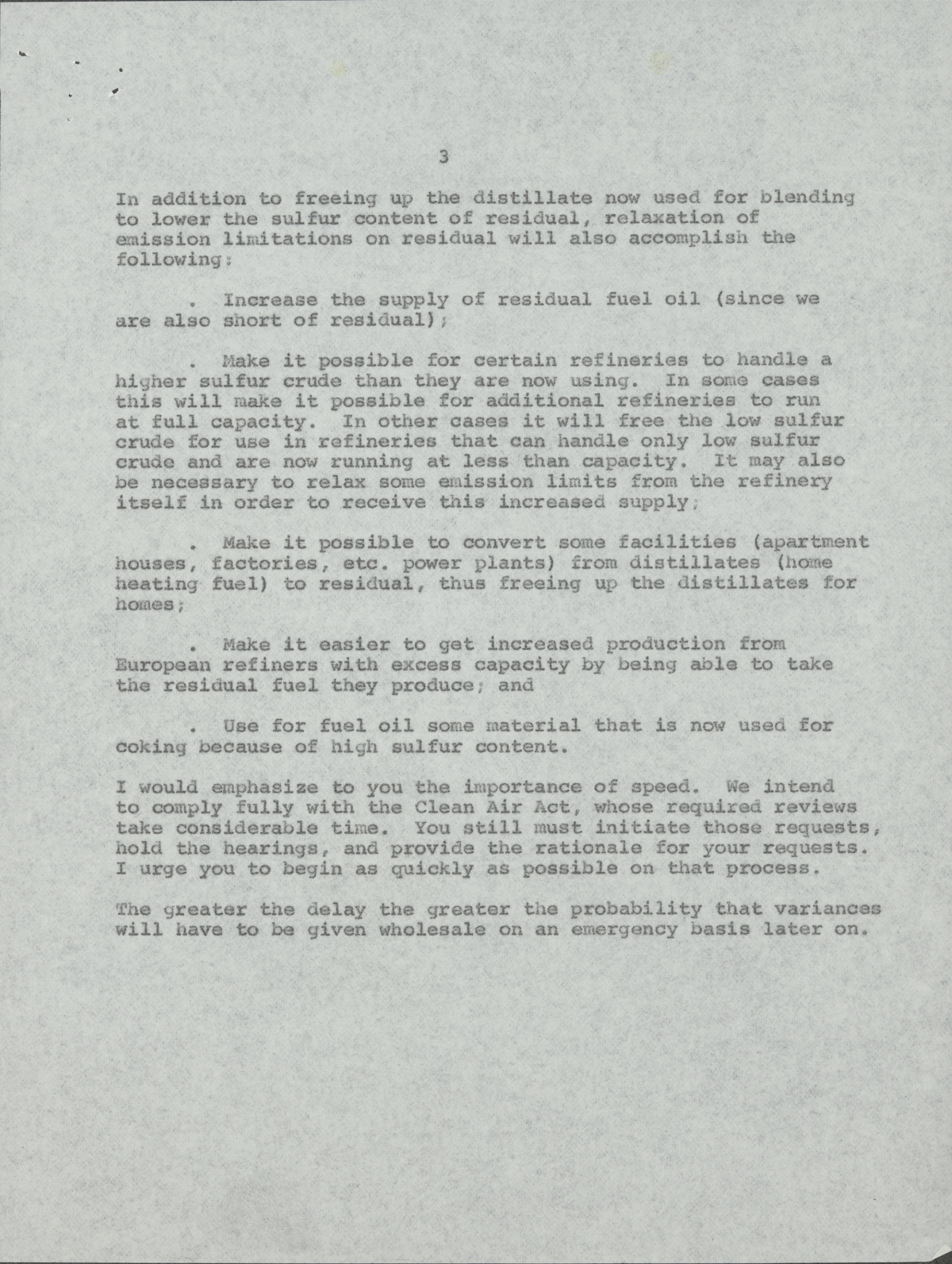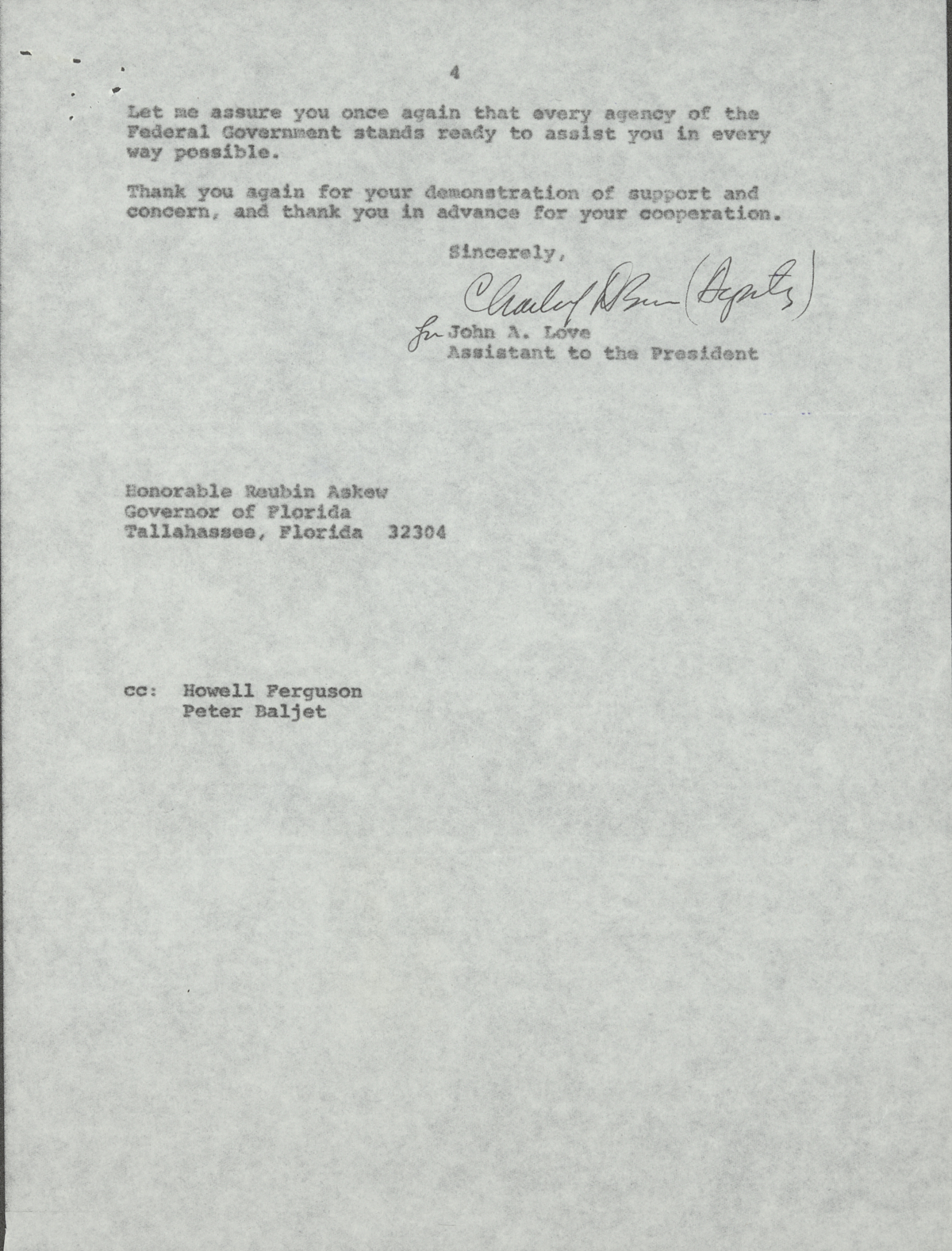Florida Memory is administered by the Florida Department of State, Division of Library and Information Services, Bureau of Archives and Records Management. The digitized records on Florida Memory come from the collections of the State Archives of Florida and the special collections of the State Library of Florida.

State Archives of Florida
- ArchivesFlorida.com
- State Archives Online Catalog
- ArchivesFlorida.com
- ArchivesFlorida.com
State Library of Florida
Related Sites
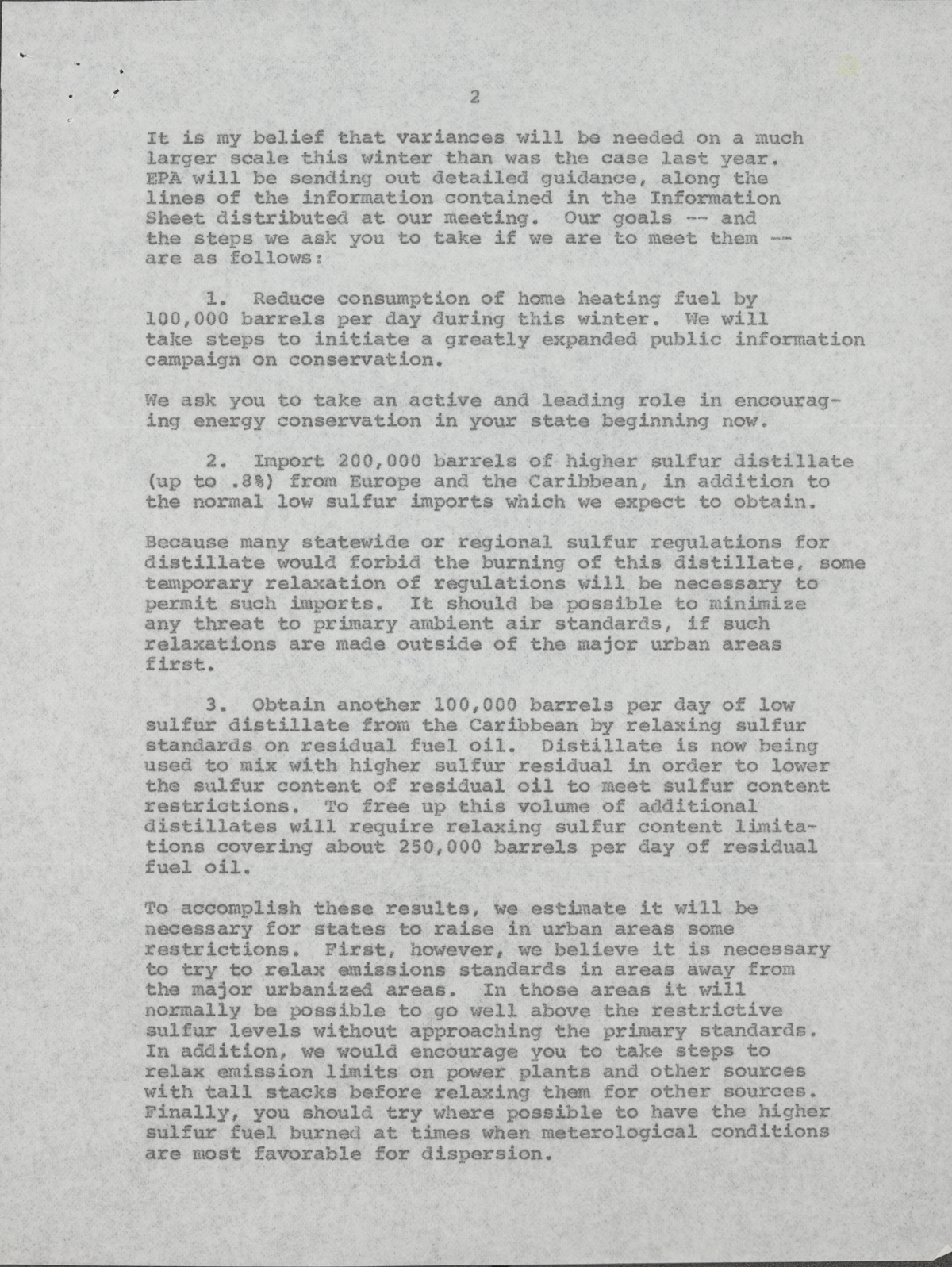
Description of previous item
Description of next item

Letters between John Arthur Love, assistant to President Nixon, and Governor Askew about energy supply and shortages, 1973
Source
Description
Date
Contributors
Format
Topic
Subjects
Geographic Term
General Note
In 1973, members of the Organization of Arab Petroleum Exporting Countries (OAPEC) placed an oil embargo on the United States in response to President Nixon’s support of Israel during the Yom Kippur War.
With energy shortages and skyrocketing prices, the United States had to create strategies for conserving fuel. President Nixon even created a new agency called the Federal Energy Office, later the Federal Energy Administration. Other tactics included reducing highway speed limits to 55 miles per hour, and putting the country on year-round Daylight Saving Time.
Although the oil embargo was lifted in March of 1974, the impacts of the crisis were felt throughout the rest of the decade. The United States was in an economic recession until 1975, and the country experienced a second energy crisis in 1979 in the aftermath of the Iranian Revolution.
1. Reduce consumption of home heating fuel by 100,000 barrels per day during this winter. We will take steps to initiate a greatly expanded public information campaign on conservation.
We ask you to take an active and leading role in encouraging energy conservation in your state beginning now.
2. Import 200,000 barrels of higher sulfur distillate (up to .8%) from Europe and the Caribbean, in addition to the normal low sulfur imports which we expect to obtain.
Because many statewide or regional sulfur regulations for distillate would forbid the burning of this distillate, some temporary relaxation of regulations will be necessary to permit such imports. It should be possible to minimize any threat to primary ambient air standards, if such relaxations are made outside of the major urban areas first.
3. Obtain another 100,000 barrels per day of low sulfur distillate from the Caribbean by relaxing sulfur standards on residual fuel oil. Distillate is now being used to mix with higher sulfur residual in order to lower the sulfur content of residual oil to meet sulfur content restrictions. To free up this volume of additional distillates will require relaxing sulfur content Limitations covering about 250,000 barrels per day of residual fuel oil.
To accomplish these results, we estimate it will be necessary for states to raise in urban areas some restrictions. First, however, we believe it is necessary to relax emissions standards in areas away from the major urbanized areas. In those areas it will normally be possible to go well above the restrictive sulfur levels without approaching the primary standards. In addition, we would encourage you to take steps to relax emission limits on power plants and other sources with tall stacks before relaxing them for other sources. Finally, you should try where possible to have the higher sulfur fuel burned at times when meterological [sic.] conditions are most favorable for dispersion.
Title
Subject
Description
Creator
Source
Date
Contributor
Format
Language
Type
Identifier
Coverage
Geographic Term
Thumbnail
ImageID
topic
Subject - Corporate
Subject - Person
Transcript
Honorable John A. Love
Assistant to the President
The White House
Washington, D. C.
Dear John:
It was my pleasure to be able to attend the White House meeting with the President, Secretary Morton, Administrator Train, and you concerning our fuel oil problem and projections for this winter.
Your letter of September 21, 1973 was very helpful in summarizing the meeting and emphasizing points which were not fully covered during the discussion.
We intend to follow your counsel and to inventory major petroleum users within the State to determine if a postponement of our compliance schedules is appropriate. In this regard, we look forward to staying fully informed by your office on any upcoming developments and particularly on the mandatory fuel allocation programs.
With kind regards,
Sincerely,
Governor
ROA/qsw/HLF
THE WHITE HOUSE
WASHINGTON
September 21, 1973
Dear Reubin:
Thank you for coming to Washington on such short notice to discuss our national energy problems and proposed solutions with the President, Secretary Morton, Administration Train and me. I believe that the President made our position clear at the meeting – we are going to have a difficult time meeting energy demands this winter. We may have shortages of up to 400,000 barrels per day of low sulfur distillate. We must initiate action now to alleviate those shortages. We can do so only with your cooperation.
With your help we will reduce demand, increase our supplies of home heating fuel, and minimize negative impact on the environment. If we wait, we may not be able to hope for so much, and may find that higher sulfur fuels will have to be used in areas where it is least desirable. Import needs could range from 650 to 800 thousand barrels per day compared to 400 thousand last winter. We are going to have problems obtaining such a level of supply from Caribbean and European markets. Unfortunately, the burden of potential shortages is likely to fall more than proportionately on a few areas. The message that several of the Governors were quite concerned about the availability of oil came across to me loud and clear at the meeting. Their comments will be considered carefully during the President’s review of the allocation question. However, whatever the outcome of that decision, we must take steps to increase supplies and dampen demand.
It is important to recognize that stringent sulfur restrictions can limit the supplies of available fuel oil this winter. The probably source of incremental imports to the U.S. is Europe. The sulfur content of home heating oil produced there is .5 - .7%, roughly twice that of U.S. production. These imports would normally be consumed in or near the large eastern seaboard cities. However, the more restrictive sulfur emission limitations in those areas (.2 - .5%) can prevent the importation of needed fuel supplies unless temporary variances to state regulations are approved.
1. Reduce consumption of home heating fuel by 100,000 barrels per day during this winter. We will take steps to initiate a greatly expanded public information campaign on conservation.
We ask you to take an active and leading role in encouraging energy conservation in your state beginning now.
2. Import 200,000 barrels of higher sulfur distillate (up to .8%) from Europe and the Caribbean, in addition to the normal low sulfur imports which we expect to obtain.
Because many statewide or regional sulfur regulations for distillate would forbid the burning of this distillate, some temporary relaxation of regulations will be necessary to permit such imports. It should be possible to minimize any threat to primary ambient air standards, if such relaxations are made outside of the major urban areas first.
3. Obtain another 100,000 barrels per day of low sulfur distillate from the Caribbean by relaxing sulfur standards on residual fuel oil. Distillate is now being used to mix with higher sulfur residual in order to lower the sulfur content of residual oil to meet sulfur content restrictions. To free up this volume of additional distillates will require relaxing sulfur content Limitations covering about 250,000 barrels per day of residual fuel oil.
To accomplish these results, we estimate it will be necessary for states to raise in urban areas some restrictions. First, however, we believe it is necessary to relax emissions standards in areas away from the major urbanized areas. In those areas it will normally be possible to go well above the restrictive sulfur levels without approaching the primary standards. In addition, we would encourage you to take steps to relax emission limits on power plants and other sources with tall stacks before relaxing them for other sources. Finally, you should try where possible to have the higher sulfur fuel burned at times when meterological [sic.] conditions are most favorable for dispersion.
- Increase the supply of residual fuel oil (since we are also short of residual);
- Make it possible for certain refineries to handle a higher sulfur crude than they are now using. In some cases this will make it possible for additional refineries to run at full capacity. In other cases it will free the low sulfur crude for use in refineries that can handle only low sulfur crude and are now running at less than capacity. It may also be necessary to relax some emission limits from the refinery itself in order to receive this increased supply;
- Make it possible to convert some facilities (apartment houses, factories, etc. power plants) from distillates (home heating fuel) to residual, thus freeing up the distillates for homes;
-Make it easier to get increased production from European refiners with excess capacity by being able to take the residual fuel they produce; and
- Use for fuel o4l1 some material that is now used for coking because of high sulfur content.
I would emphasize to you the importance of speed. We intend to comply fully with the Clean Air Act, whose required reviews take considerable time. You still must initiate those requests hold the hearings, and provide the rationale for your requests. I urge you to begin as quickly as possible on that process.
The greater the delay the greater the probability that variances will have to be given wholesale on an emergency basis later on.
Thank you again for your demonstration of support and concern, and thank you in advance for your cooperation.
Sincerely,
[signed] Charles DiBona (Deputy)
for John A. Love
Assistant to the President
Honorable Reubin Askew
Governor of Florida
Tallahassee, Florida 32304
cc: Howell Ferguson
Peter Baljet
General Note
In 1973, members of the Organization of Arab Petroleum Exporting Countries (OAPEC) placed an oil embargo on the United States in response to President Nixon’s support of Israel during the Yom Kippur War.
With energy shortages and skyrocketing prices, the United States had to create strategies for conserving fuel. President Nixon even created a new agency called the Federal Energy Office, later the Federal Energy Administration. Other tactics included reducing highway speed limits to 55 miles per hour, and putting the country on year-round Daylight Saving Time.
Although the oil embargo was lifted in March of 1974, the impacts of the crisis were felt throughout the rest of the decade. The United States was in an economic recession until 1975, and the country experienced a second energy crisis in 1979 in the aftermath of the Iranian Revolution.
Chicago Manual of Style
Askew, Reubin O'Donovan, 1921-2014. Letters between John Arthur Love, assistant to President Nixon, and Governor Askew about energy supply and shortages, 1973. 1973. State Archives of Florida, Florida Memory. <https://www.floridamemory.com/items/show/350882>, accessed 15 December 2025.
MLA
Askew, Reubin O'Donovan, 1921-2014. Letters between John Arthur Love, assistant to President Nixon, and Governor Askew about energy supply and shortages, 1973. 1973. State Archives of Florida, Florida Memory. Accessed 15 Dec. 2025.<https://www.floridamemory.com/items/show/350882>
AP Style Photo Citation
(State Archives of Florida/Askew)

 Listen: The Bluegrass & Old-Time Program
Listen: The Bluegrass & Old-Time Program